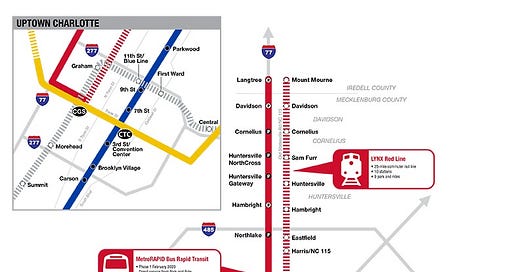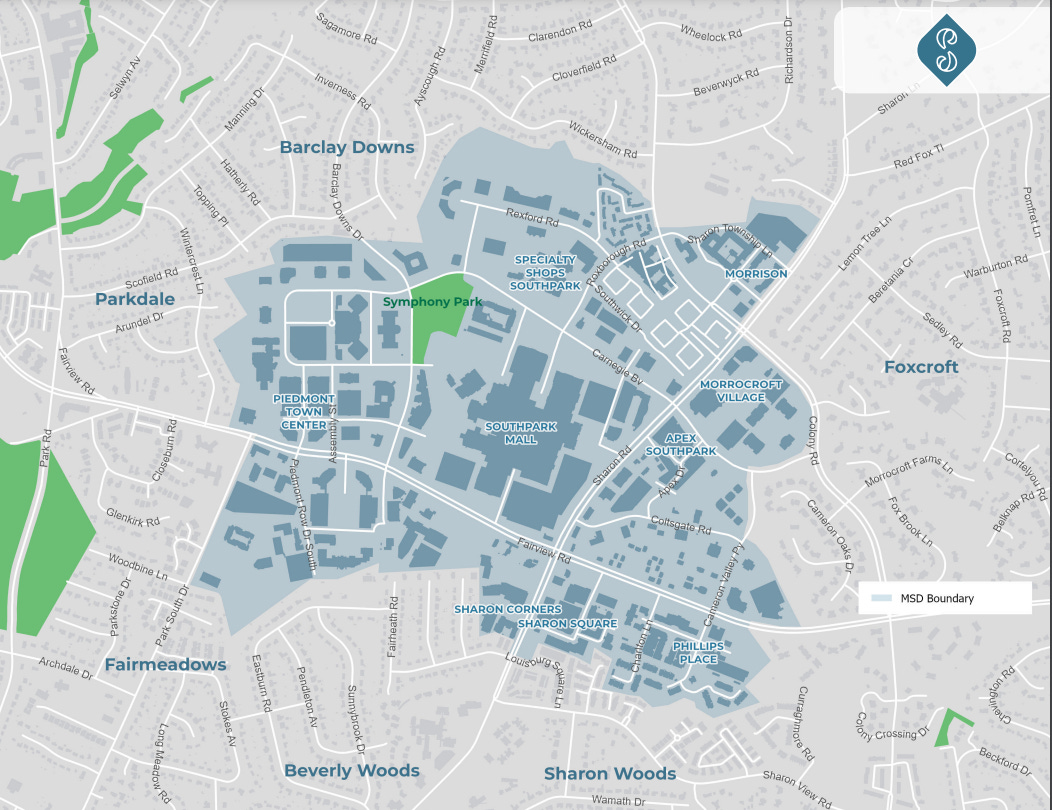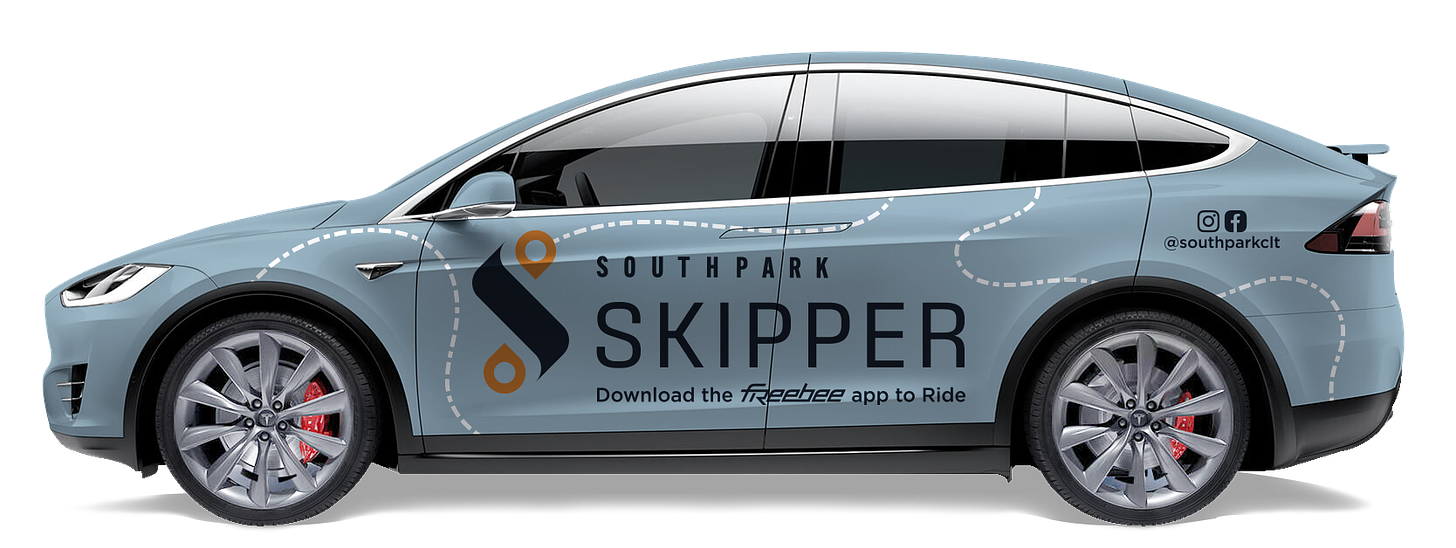Outlook for transit plan: more delays ahead?
Plus: SouthPark to launch free on-demand rides in EVs
You’re reading Transit Time, a weekly newsletter for Charlotte people who leave the house. Cars, buses, light rail, bikes, scooters … if you use it to get around the city, we write about it. Transit Time is produced in partnership between The Charlotte Ledger and WFAE.
After a burst of momentum this month, decisions are shifting away from the city; a key legislator says not to expect quick action from Raleigh and mayor advises patience
by Tony Mecia
For years, the city of Charlotte has labored to advance a plan that would expand transit.
It has formed commissions, spent millions on studies, consumed countless hours in discussions and repeatedly made the case for more rail and better buses to serve the needs of a growing city.
But now, after all that work, the future of the transit plan that the city has shaped and pushed lies largely outside of the city’s control.
The fate of the $25 billion plan, which calls for a referendum on raising the Mecklenburg sales tax to pay for rail, buses and road-related projects, rests with others, such as state legislators, county commissioners and voters.
City leaders have made some significant steps that materialized this month — such as buying the tracks for the Red Line to northern Mecklenburg and securing the backing of five of the six Mecklenburg towns. But there’s only so much the city can do.
When the city was largely calling the shots, the plan didn’t exactly move quickly.
Now that the future rests almost entirely with other entities, there are signs that slower pace could continue.
Local leaders had hoped that the General Assembly would green-light the plans in a session in November, with an eye toward placing the referendum on the ballot in November 2025.
But this week, Vickie Sawyer, a Republican who represents Iredell and northern Mecklenburg and co-chairs the N.C. Senate’s transportation committee, told the Charlotte Business Journal that it is unlikely legislators would consider taking up the measure this year because of election-year distractions and procedural requirements.
It is possible legislators could take up the matter in early 2025 and leave enough time for a referendum the following November, but that’s uncertain. Waiting until early 2025 would mean it could be considered by new legislators, including a new speaker of the N.C. House, as longtime speaker Tim Moore is running for Congress.
Asked by Transit Time about Sawyer’s comments this week, and whether that’s a setback to the transit plan, Mayor Vi Lyles said: “I always listen to what the legislators say, and I try to make sure that as they make those statements, if there’s a way that we can help explain things, that we get involved with them and work through it.” She added: “We’ll just keep being patient until we get it done.”
Asked if there is a new timeline for the transit plan, the mayor replied: “There is no timeline, because we’re not in charge of that timeline.”
At the same time, as the city’s role recedes, Mecklenburg County commissioners will play an increasingly larger role. If the legislature approves the proposal, commissioners would have to vote to place the referendum on the ballot. And then if a majority of voters back the measure, commissioners would be asked to vote again to approve the hike in the sales tax to 8.25%, from 7.25%. Commissioners would also vote to create a countywide transit authority.
“Mecklenburg County is in total control of how and when this gets before the public,” County Manager Dena Diorio told commissioners last week.
With no clear timeline and the plan now resting in the hands of other leaders, Charlotte’s push for expanded transit could be poised for continued delays. That’s a scenario that feels familiar.
Tony Mecia is executive editor of The Charlotte Ledger. Reach him at tony@cltledger.com.
Related Transit Time article:
“The basics of Charlotte’s new transit plan” (Aug. 22)
Free on-demand EV car rides are heading to SouthPark; New ‘SouthPark Skipper’ aims to ‘feel like a concierge service’
The SouthPark area is getting a free Uber-like service that will pick up and drop off people within the area’s business district.
It’s the latest Charlotte-area example of what’s known as “microtransit,” or on-demand transportation that doesn’t follow a fixed route.
“We want SouthPark to become a case study for the region and beyond on creating ways to move people around,” said Adam Rhew, CEO of SouthPark Community Partners, in announcing the new service at a meeting on Thursday morning.
He said the service could help workers get to their jobs from bus stops and to try new places for lunch without moving their cars. It would also allow hotel guests to explore new destinations within SouthPark.
SouthPark’s service will be called the “SouthPark Skipper.” It will be run with electric vehicles that can be called through an app, and it starts Nov. 15. It will be available daily from 9 a.m. to 9 p.m. The rides will be operated by Freebee, which operates in more than 40 East Coast markets. It is a one-year test project but could be extended.
The new “SouthPark Skipper” will offer pick-ups and drop-offs within the boundaries of the SouthPark business district (in blue above).
Rhew said drivers will be “highly knowledgeable and trained about SouthPark.”
‘Like a concierge service’: “Electric vehicles will come pick you up and take you there, and in a perfect world, it will be an incredible experience,” he said. “It will feel like concierge service.”
Electric vehicles can be called on demand with an app. (Courtesy of SouthPark Community Partners)
On-demand ride services have taken off with the rise of Uber and Lyft. This year, the city of Gastonia replaced its bus service with a fleet of on-demand vans, SUVs and sedans. There have been other experiments, too, including GEST Carts, an advertising-supported free shuttle service in South End and uptown; and free rides by a company called Jaunt on weekends this summer in Plaza Midwood.
The Charlotte Area Transit System is also working to start a similar service in northern Mecklenburg by early next year.
In brief…
Public meetings on Red Line: The Charlotte Area Transit System is holding a series of public meetings to discuss the future Red Line commuter rail. They are Sept. 30 at Camp North End, Oct. 3 at Cornelius Town Hall and Oct. 8 virtually. Details here.
More driving: Charlotte motorists are driving more now than they did before Covid. The average vehicle miles traveled in Charlotte has risen 21% since 2019, which is higher than the national average, according to a recent report. (Axios Charlotte)
Transit Time is a production of The Charlotte Ledger and WFAE. You can adjust your newsletter preferences on the ‘My Account’ page.
Did somebody forward you this newsletter and you need to sign up? You can do that here:
Other affiliated Charlotte newsletters and podcasts that might interest you:
The Charlotte Ledger Business Newsletter, Ways of Life newsletter (obituaries) and Fútbol Friday (Charlotte FC), available from The Charlotte Ledger.
The Inside Politics newsletter, available from WFAE.









I am not as familiar with this transit plan as I should be, but I have a question. Earlier this year I read that the Charlotte-Mecklenburg School System planned to buy several new electric buses. I have no problem with the concept of that, but isn't there an opportunity here for the school system to collaborate with the transit system and reduce costs over time? It seems like it would be worth talking about. The transit system needs more consistent ridership, and the school system wants more energy efficient buses. Seems like it could be a perfect opportunity. Why do I think no one in either system will like it?
DavidT